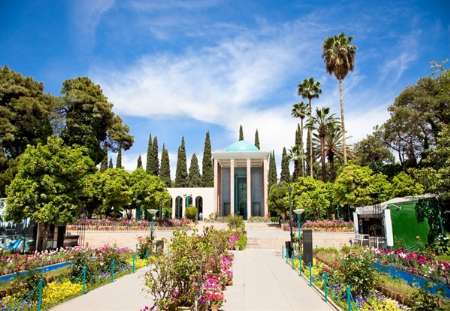
Persian literature professor Gholam Hossein Ebrahimi Dinani, announced this in a confab organized by Book City Institute to commemorate the eminent Persian poet Sa'di Shirazi, Tehran based English newspaper Iran Daily reported on Tuesday.
April 21 is observed as National Sa'di Day in Iran.
'Sa'di's works have prominent features which have been very effective in preserving and reviving the Persian language,' Dinani said.
'Although Sa'di conversed in Persian language prevalent 700 years ago, his works are easy to understand by contemporary people. This is while, the British, for instance, have difficulty comprehending William Shakespeare poems without interpretation.'
Dinani further said the uniqueness of Sa'di's art lies in the way he applies aspects of Persian language in his prose and poem.
'He always chooses the most appropriate words to express his ideas through his sonnets and odes.'
The philosopher said the beauty of Sa'di's sonnets is pure and indescribable, adding he has his own unique way of expressing ideas and concepts through words.
'He was wise. The way he has illustrated social relations in his works has surprised social sciences experts.
'He stressed that Eastern and Western politicians are required to learn politics and human relationships from the Persian poet.'
Muslih-Ud-Din Mushrif ibn Abdullah (1184-1291 AD) is one of the major Persian poets from the medieval era. He is recognized not only for the quality of his writing, but also for the depth of his social thought. His works have been translated by a number of major Western poets.
Sa'di began studying literature and Islamic sciences in his early childhood. He continued his education in Baghdad's Al-Nizamiyya School, the most prestigious educational institution at the time.
The unstable conditions in Persia following the Mongol invasion encouraged him to travel far and wide. He traveled to Ethiopia, Egypt, the Maghrib (North Africa), Syria, Palestine, Armenia and Turkey, becoming knowledgeable with the culture and conventional wisdom of various peoples.
Many people compare Sa'di's numerous travels and his adventures, which took him almost 30 years (between 1226 and 1256), to Marco Polo's long journey in the region from 1271 to 1294.
Sa'di's best known works are 'Bustan' completed in 1257 AD and 'Golestan' (The Rose Garden) in 1258 AD.
'Bustan' is entirely in verse (epic meter) and consists of stories aptly illustrating the standard virtues recommended to Muslims (justice, liberality, modesty, contentment) as well as of reflections on the behavior of dervishes and their ecstatic practices.
'Golestan' is mainly in prose and contains stories and personal anecdotes. The text is interspersed with a variety of short poems, containing aphorisms, advice, and humorous reflections.
To mark National Sa'di Day, Iranian cultural officials hold numerous events to honor Sa'di while Iranian National Commission for UNESCO holds a ceremony themed 'Sa'di's status in the modern world'.

Add new comment